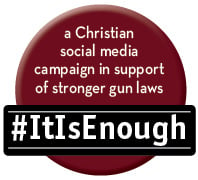It has been a year since I gathered with other parents in my children’s elementary school cafeteria, shocked, stricken, and aware that nothing would ever be the same again, after 20 first graders and several women were murdered by a troubled boy with a gun. My own youngest child was a first grader too. I don’t know how those parents feel. I don’t. But I can imagine. Below I am reposting a meditation on grace and what happens when grace appears absent. I don’t know how valid my theology is, but it rang true to me then, and does still today. A former rector of mine told me that his post-Sandy Hook sermon was remarkably similar to this post. So there’s that.
Two months after Sandy Hook, Katherine Willis Pershey and I launched an informal coalition of Christians who support gun law reforms, called #ItIsEnough. She and I are talking about what next steps the coalition might take, and we will let folks know when we’ve figured it out. In the meantime, read Katherine’s essay on A Deeper Family titled “God Damn Guns,” this Huffington Post piece on progress made and not made in the past year, and this National Catholic Review essay on “Inexcusable Inaction.”
God bless the families who lost those they love on December 14, 2012. #ItIsEnough
As I huddled beneath my flannel sheets the Friday night of the Sandy Hook shooting, two of my children safely in their beds, my oldest daughter out with my husband driving several of her friends home, I surprised myself by whispering, “There but for the grace of God go I,” that old cliché that comes in response to tragedy. Friday’s Newtown, Conn., school shooting, which resulted in 20 children’s murders, took place in my small state, in a town whose bare winter trees and sturdy New England colonials look like home. With three kids in public school, including a first grader (all of the young victims were first graders, although on Friday night all I knew was that they were very, very young), I could too easily imagine with excruciating clarity how a regular day deteriorated into chaos, fear, and murder at Sandy Hook Elementary. I went to bed on that night more aware than usual of how lucky I was to have tucked my children’s warm, breathing little bodies into bed. My gratitude came tied up with the paralyzing knowledge that it could have been my kids’ school violated, my kids’ principal murdered, one of my kids whose last memory on this earth was of wondering why the scary stranger with the gun was pointing it at him.
And so the cliché, “There but for the grace of God…” came unbidden, and I was immediately ashamed of myself for even thinking it.
I dislike this sentiment, as many Christians do, because of what it implies about how God works in the world. By saying it, I felt I was implying that God—God’s actions, God’s presence—ensured that the most notable aspects of my children’s school day on December 14, 2012, were pizza for lunch and Ben’s 100% score on his spelling test. That implication, I thought, leads naturally to its horrifying opposite—that God was neither active nor present at Sandy Hook Elementary School on December 14, 2012. “There but for the grace of God” seems to imply that God is ultimately and directly responsible for whether our days end in blessed normality or incomprehensible tragedy.
I don’t care how poetically Christians spin such a notion with metaphors about God’s ultimate plan being like a beautiful tapestry of which we can only see the chaotic, sometimes ugly backing. There is no divine purpose that explains the random murders of children and their caretakers in an elementary school.
But Friday night, when that worn, distasteful cliché came to me unbidden, I forced myself to think about why I grasped at these words for comfort, about what they really mean.
I realized that the phrase doesn’t actually speak of God’s will or purpose, God’s action or inaction. We don’t say, “There but for God’s will…” or “There but for God’s action…”. I began to wonder if I, in my disgust over all those other terrible Christian clichés that imply a divine purpose in tragedy, was misreading this particular cliché. (“God won’t give you more than you can handle”? Yes, I’m sure that the parents of those 20 dead children are just so comforted, downright flattered, by the idea that God decided they could handle their babies’ brutal murders.)
The phrase that popped into my head Friday night talks not about God’s actions or purposes or intentions or will, but of God’s grace.
The word grace has many different meanings and layers of meanings. It can be translated as words like favor, mercy, pity, steadfastness, forgiveness, acceptance, love. Grace always occurs in relationship; there is a grace giver and a receiver of that grace. While we can refer specifically to God’s grace manifest in the redeeming life, death, and resurrection of Christ, and grace as God’s willingness to love, accept, and forgive us always and in every circumstance, God is not the sole vehicle of grace. People offer grace to one another, embody grace through actions such as forgiveness and mercy, manifest grace through art, literature, and music. Even objects and natural occurrences can be instruments of grace when we interpret them as tangible signs of God’s love and the fundamental goodness of creation.
Grace is precisely what made it possible for my children to come home from school on Friday safe, sound, and happy. Grace is precisely what allows blessed normality to define most of our days. Grace is behind every act of care offered to our children by teachers, school bus drivers, crossing guards, careful drivers, coaches, neighbors, other parents. Grace, in the form of mutual trust, understanding, and kindness, allows people with vastly different personalities and histories and values and interests and preoccupations to mingle with each other in the wider world, in schools, shopping malls, neighborhoods, and grocery stores, in relative safety, without conflict or violence, most of the time. Grace stops most people from taking out their anger and pain on other people’s children. Grace allows most of us to go to bed most nights in roughly the same decent condition in which we arose in the morning. Grace is evident in millions of mundane, ordinary acts of care that allow us to live our mundane, ordinary lives.
There are stories coming out of Sandy Hook Elementary about a staff member who turned on the PA system so that teachers would know that something terrible was happening, of teachers calmly locking doors and herding kids into closets (even pulling out paper and crayons to keep them busy), and at least one story of a teacher who literally put her body between the gunman and her students.
Those extraordinary acts of courage and care were also grace. Most Sandy Hook students and staff made it back home Friday evening because of grace. And my children and millions of other schoolchildren made it home safely on Friday for the same reason they made it home safely every other school day of their lives—because grace (trust, mercy, steadfastness, love), born of God, marks our human interactions and daily routines more often than it does not.
But what, then, of the children and teachers who didn’t make it home on Friday? Where was grace then?
I cannot even begin to craft words that could answer that question, and do not dare even try. I do, however, have a picture in my head.
I picture that absolute darkness in which you lose all sense of where you are, of what and who is nearby. You lose awareness of your own body, unable to see your own hand raised in front of your face. The darkness severs you from your very self. I think of the scene in the novel The Kite Runner in which the main character and his father escape war-torn Afghanistan in the empty body of an oil tanker truck. It is absolutely pitch black, so the father pulls out his lighted digital watch and holds it in front of his son’s face for the hours-long ride. The dim green light gives the son just enough assurance that he is not alone. The darkness has almost but not quite obliterated him and all he knows.
I picture gunman Adam Lanza carrying that sort of darkness with him into Sandy Hook Elementary on Friday morning. I wonder if for him, the light of God’s grace was not merely unseen, but actually unimaginable in those final hours of his life. I picture him carrying that palpable, impenetrable darkness, which severed his ability to connect with anyone around him or even with himself, into those school corridors, along with his weapons and rage and grief.
My Oxford Companion to the Bible says this about grace:
One senses God’s graciousness by observing the best of human action…human grace imitates and depicts God’s grace.
I wonder if the inverse might also be true: By observing the worst of human action, one senses the void where grace wasn’t, for a few heartrending minutes on a regular Friday morning. I won’t speculate why or how that could be, except to say again that grace occurs in relationship. Givers and receivers. We know from our human relationships that people sometimes cannot or will not receive what is given; I wonder if Adam Lanza was unable or unwilling to even look to see if there was a glimmer of light at the edge of his darkness.
As with anything to do with relationships, grace is not a static phenomenon that can isolated, marked, and studied, but a mystery.
May the families of Newtown be awash in that mystery in the days to come. Where sin has increased, may grace increase all the more (Romans 5:20).












